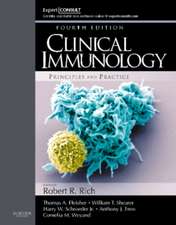Sex Hormones and Immunity to Infection
Editat de Sabra L. Klein, Craig Robertsen Limba Engleză Paperback – 11 oct 2014
Among human and nonhuman animals, the prevalence and intensity of infection typically is higher in males than females and may reflect differences in exposure as well as susceptibility to pathogens. Elevated immunity among females is a double-edged sword in which it is beneficial against infectious diseases but is detrimental in terms of increased development of autoimmune diseases.
The present book critically reviews the evolutionary origin and the functional mechanisms responsible for sexual dimorphism in response to infection. It emphasizes the value of examining responses in both males and females to improve our understanding about host-pathogen interactions in both sexes.
The contributors are experts in their specific disciplines which range from microbiology and immunology to genetics, pathology, and evolutionary biology.
The book aims at bringing insight to the treatment and management of infectious diseases; it delineates areas where knowledge is lacking and highlights future avenues of research.
| Toate formatele și edițiile | Preț | Express |
|---|---|---|
| Paperback (1) | 1790.24 lei 6-8 săpt. | |
| Springer Berlin, Heidelberg – 11 oct 2014 | 1790.24 lei 6-8 săpt. | |
| Hardback (1) | 1797.20 lei 6-8 săpt. | |
| Springer Berlin, Heidelberg – 12 noi 2009 | 1797.20 lei 6-8 săpt. |
Preț: 1790.24 lei
Preț vechi: 1884.47 lei
-5% Nou
Puncte Express: 2685
Preț estimativ în valută:
342.60€ • 372.02$ • 287.79£
342.60€ • 372.02$ • 287.79£
Carte tipărită la comandă
Livrare economică 23 aprilie-07 mai
Preluare comenzi: 021 569.72.76
Specificații
ISBN-13: 9783642425516
ISBN-10: 3642425518
Pagini: 332
Ilustrații: X, 319 p.
Dimensiuni: 155 x 235 x 17 mm
Greutate: 0.47 kg
Ediția:2010
Editura: Springer Berlin, Heidelberg
Colecția Springer
Locul publicării:Berlin, Heidelberg, Germany
ISBN-10: 3642425518
Pagini: 332
Ilustrații: X, 319 p.
Dimensiuni: 155 x 235 x 17 mm
Greutate: 0.47 kg
Ediția:2010
Editura: Springer Berlin, Heidelberg
Colecția Springer
Locul publicării:Berlin, Heidelberg, Germany
Public țintă
ResearchCuprins
Sex Differences in Susceptibility to Infection: An Evolutionary Perspective.- Effects of Sex Steroids on Innate and Adaptive Immunity.- Sex Steroid Receptors in Immune Cells.- Sex Differences in Susceptibility to Viral Infection.- Sex Differences in Innate Immune Responses to Bacterial Pathogens.- Sex Hormones and Regulation of Host Responses Against Parasites.- Sex Differences in Parasitic Infections: Beyond the Dogma of Female-Biased Resistance.- Progesterone, Pregnancy, and Innate Immunity.- Pregnancy and Susceptibility to Parasites.- Sex Steroids and Risk of Female Genital Tract Infection.- Sex, Pregnancy and Measles.- Epilogue: Challenges for the Future.
Recenzii
From the reviews:“This book highlights the differences between males and females in their susceptibility to infection with viruses, bacteria and parasites. … This is a well-structured and eminently readable book. Those interested in the pathogenesis of infectious disease will find this a welcome addition. Recommended for institutional purchase as students will find this a useful reference source.” (Anthony Nash, Microbiology Today, August, 2010)
Textul de pe ultima copertă
Why sex matters
Among human and nonhuman animals, the prevalence and intensity of infection typically is higher in males than females and may reflect differences in exposure as well as susceptibility to pathogens. Elevated immunity among females is a double-edged sword in which it is beneficial against infectious diseases but is detrimental in terms of increased development of autoimmune diseases.
The present book critically reviews the evolutionary origin and the functional mechanisms responsible for sexual dimorphism in response to infection. It emphasizes the value of examining responses in both males and females to improve our understanding about host-pathogen interactions in both sexes.
The contributors are experts in their specific disciplines which range from microbiology and immunology to genetics, pathology, and evolutionary biology.
The book aims at bringing insight to the treatment and management of infectious diseases; it delineates areas where knowledge is lacking and highlights future avenues of research.
Among human and nonhuman animals, the prevalence and intensity of infection typically is higher in males than females and may reflect differences in exposure as well as susceptibility to pathogens. Elevated immunity among females is a double-edged sword in which it is beneficial against infectious diseases but is detrimental in terms of increased development of autoimmune diseases.
The present book critically reviews the evolutionary origin and the functional mechanisms responsible for sexual dimorphism in response to infection. It emphasizes the value of examining responses in both males and females to improve our understanding about host-pathogen interactions in both sexes.
The contributors are experts in their specific disciplines which range from microbiology and immunology to genetics, pathology, and evolutionary biology.
The book aims at bringing insight to the treatment and management of infectious diseases; it delineates areas where knowledge is lacking and highlights future avenues of research.







